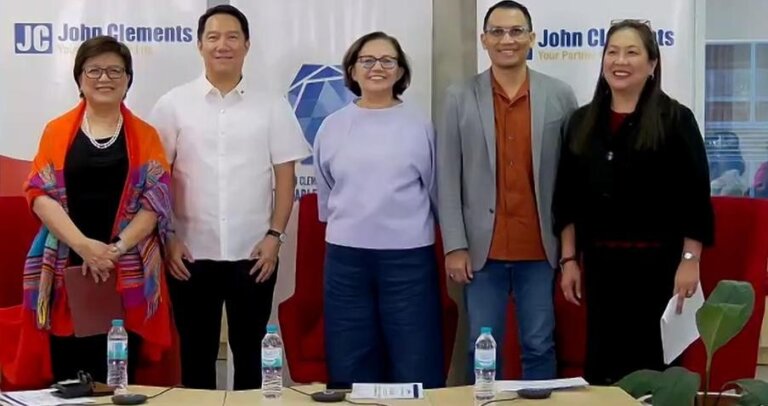Can our leaders of today, especially the young ones who will be leading our organizations in the future, be able to navigate the unknown, evolve rapidly in this fast-changing world, and have the perseverance to move ahead even if they do not have the answers? This was one of the questions we wanted answered by our diverse and talented industry leaders last April 28, 2023, at the Weekly with JC Leadership and HR Series Fireside Chat, entitled “Demystifying Tomorrow’s Leaders through the HR Lens”. The lineup of panelists included Ardhi Lufti Siregar, Head of Human Resources of Manulife Global Business Services (Philippines and Chengdu, China) and MTS Malaysia; Ma. Elizabeth D. Nasol, DPM, SVP and Head of the Human Resources Management Group of Energy Development Corporation; and Paolo T. Garcia, Chief Executive Officer of Marsh McLennan Philippines.
Grace Sorongon, Senior Vice President and Managing Director of John Clements Consultants, welcomed around 140 participants, who joined at the JC Hub and via Zoom. Alina Manaig, Assistant Vice President and Head of RPO Operations of Professional Staffers, opened the fireside chat by asking the panelists where to find leaders who are grounded in business issues. Beth Nasol shared that leadership is changing; thus, no single formula can be applied. She then highlighted three points—first, leaders should look into different segments; second, leaders should be flexible and adaptable; and third, leaders should look at scenarios. She emphasized that data is important to carefully assess and plan different ways to groom leaders. Ardhi Siregar cited that the experience during the nationwide lockdown in March 2020 due to the COVID-19 pandemic made everyone deal with the unexpected. Since many people had become anxious, leaders capable of making distinctive effort during trying times were very essential. The hybrid work setup changed the way we experience work culture. It gave way to a culture of connectedness by intention, where leaders must make connections through emotions. From a CEO perspective, Paulo Garcia talked about three essential leadership qualities: capability, willingness, and a healthy amount of ambition.

During the active exchange and sharing of ideas, the panelists agreed that it is important to develop non-heroic leaders. This can be done by spotting an individual who is capable and trainable. Moreover, leaders should not focus on creating labels, but rather create a culture that can drive growth within the organization. Identifying capabilities and being able to differentiate people’s capabilities can help an organization become more agile. Change is inevitable, and leaders can only manage change within an organization if they start to listen to their people. The concept of progression over perfection was also discussed, and the panel shared the same idea that a leader should not be afraid to commit mistakes because it is a good learning opportunity to increase confidence, improve skills, and grow in various aspects. More so, scenario planning, instead of the usual 5-10 year project planning, is more relevant nowadays. According to Ardhi, their organization applies the “build-buy” approach, wherein they identify and study which critical roles can be built internally or can be bought or borrowed from other markets. Meanwhile, Beth shared that conducting stay interviews is not a task for HR practitioners alone; it is the business of everyone within the organization. Paolo agreed that once people are well taken care of, the business will go well.
Lastly, since AI (artificial intelligence) is now increasingly being used at work, the panel maintains the strong belief that it cannot replace humans, but rather help in achieving an organization’s goals and purposes. AI is here to stay to help optimize the effectiveness and efficiency of any business. Thus, leaders should learn to be more creative and take risks.
In closing, a question on how talent differentiation is possible and can be spotted by senior leaders was asked by one of the participants. To answer this question, Paolo said that if one realizes that he/she wants to become a leader, he/she should start declaring his/her aspiration of becoming a leader. He/she can start looking for a mentor, who can guide and lead in this process. The person can also communicate with senior leaders within the organization for support. Luchi Vitales, Director of HR at Monde Nissin Corporation, who was also one of the participants during the event, positively answered that character, substance, and style can make an individual stand out and be recognizable by senior leaders.
Please visit our events page to learn more about our upcoming events .





